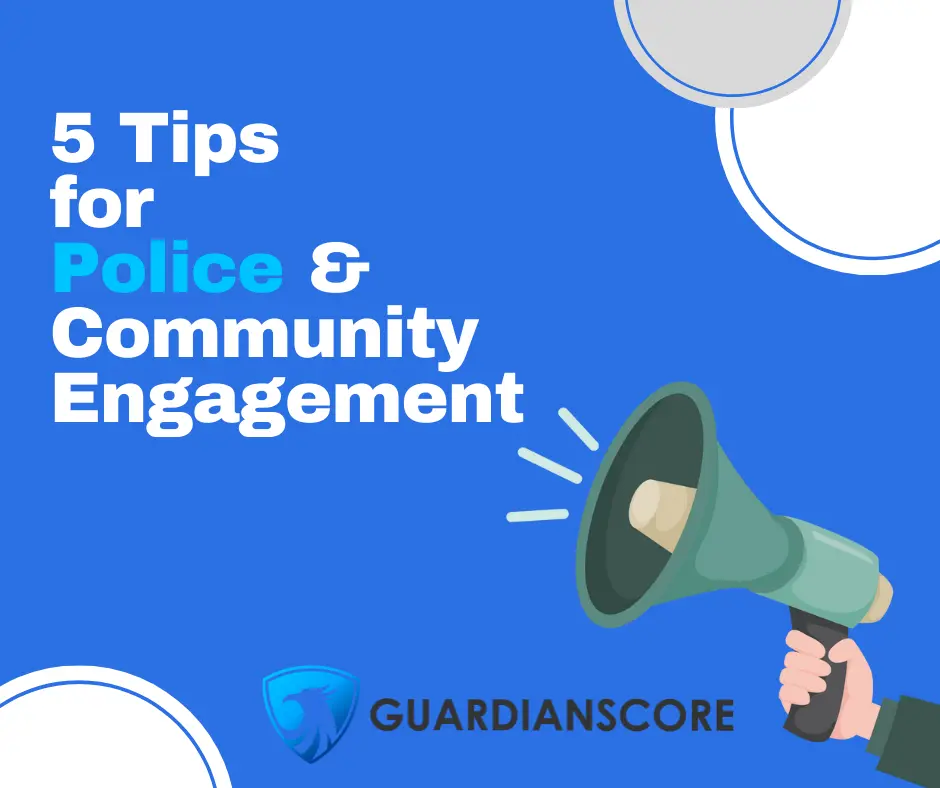
5 Tips: Community Engagement for Police Leaders
As a police leader, have you wondered about the best ways for your police department to engage with the community? What does it take to build and nurture a healthy community relationship? Luckily there are plenty of innovative leaders across the world who have come up with creative ways to connect, listen, communicate, and collaborate with the community. Here’s my top 5.
Seek Community Feedback with Surveys
I know, I am biased (ahem, Guardian Score, ahem) but there’s a reason we created the survey questions and tools that make up Guardian Score. Community members are the primary “customer” of the police. Therefore, their feedback is like pure gold for police leaders. Using Guardian Score or any other survey product available is a vital strategy and effective method for collecting community feedback. When you wonder: How are we doing? How are we treating people? Are people happy with our services? How can we improve? What we are doing great at? Are we delivering procedural justice?
When you ask community members for feedback you are able to build trust with the community by showing a genuine interest in their perspective, while also collecting meaningful and actionable data about your agency and employee performance all at the same time. At this stage in the survey world, there are a multitude of options, to include not just gathering community sentiment about police services, but also individual community feedback about individual officers and specific interactions.
Intentional Positive Engagements
We all know that some police interactions will need to involve enforcing the law. However, one way to help increase the chances of those moments going well is to spend quite a bit of effort engaging with community members in non-enforcement activities and moments of calm. This is where tons of creativity comes in. Coffee with a Cop is an example of a national event that encourages police officers and community members to meet, chat, and listen in a calm atmosphere. There are plenty of other fun examples, ranging from Pops with Cops to Cones with Cops. The point is, these events provide a casual, fun atmosphere for community members to get to know the police in a less confrontational, and more personal setting. These positive moments act as an investment in the long term relationship and trust with the community.
Listening Sessions / Community Meetings
Police departments have an opportunity to nurture the relationship with the community by actively attending and participating in a variety of community meetings. One great example, and a way to consistently reach a wide variety of community groups and geographic areas is to attend civic association meetings. This provides an opportunity to listen to community concerns from a very specific part of your jurisdiction, and helps you stay organized in terms of providing an equitable presence in all major parts of your city of county. There may also be times when it is appropriate to host or participate in listening sessions. And the key here is to truly listen. There are times when the right thing to do is to not have a well-crafted answer to every statement. Sometimes, the community just wants to know that you are interested, you care, and you are truly listening.
Dedicated Community Engagement Resources
The old adage is actions speak louder than words. Just like the old days when folks would put a community policing section on their website, but couldn’t really explain how they were actually doing community policing. Community engagement is the same thing. It can’t just be a buzzword or a hashtag. It requires an investment of time, resources, and intent. Some jurisdictions have gotten creative with creating specific specialized roles that are intended to connect with community groups. This can be more broad like a community engagement officer. Alternatively, a specific liaison officer can be established for key stakeholder community groups, such as a LGBTQ liaison officer.
Educational Opportunities for the Community
Many police departments have chosen to provide citizen police academies or youth police academies as a way to not only increase engagement with the community, but also as a way to educate the community about police practices, policies, and norms. These academies often meet once a week over a course of months, allowing for real relationships to be built between officers and community members. A bonus point here is that these citizen academies can also act as an early recruitment for folks who may be interested in a career in public safety.
There are clearly a wide variety of ways that community engagement can look and feel. However, perhaps one of the most important reminders is that the leadership of a police department must promote, measure, and reinforce the actions that surround and support a healthy community relationship. If each officer understands and believes in the idea that community engagement is a great way to spend time, it will certainly make all of the aforementioned ideas much more effective, and will come across as authentic, genuine, and a cultural theme throughout the police agency.
Ready to get started?